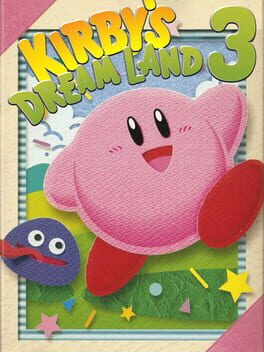▲
1
▼
 Metroids appear in the second level of Iceberg. They can only be beaten with the Ice power (mirroring how Samus needs to use the Ice Beam/Missiles to defeat them). When you beat the level, Samus can be found standing in front of the exit. If you beat all the Metroids, Samus will have her helmet off. This a likely reference to the typical Metroid convention of allowing players to get a glimpse of Samus's face by getting a 100% collection rating.
Metroids appear in the second level of Iceberg. They can only be beaten with the Ice power (mirroring how Samus needs to use the Ice Beam/Missiles to defeat them). When you beat the level, Samus can be found standing in front of the exit. If you beat all the Metroids, Samus will have her helmet off. This a likely reference to the typical Metroid convention of allowing players to get a glimpse of Samus's face by getting a 100% collection rating.
▲
1
▼
 In stage 4-1 is a flower named Hibanamodoki. Hibanamodoki bears a strong resemblance to a Fire Flower from the Super Mario Bros series.
In stage 4-1 is a flower named Hibanamodoki. Hibanamodoki bears a strong resemblance to a Fire Flower from the Super Mario Bros series.
▲
1
▼
When going to the title screen, the logo in the Japanese version is animated while in the North American version it's not animated.
▲
1
▼
 The game's "Boss Butch" mode has a hidden screen that can only be seen if the player completes the mode without taking any damage and holds down the X, L, and R buttons just before the fade to black. The ending cutscene and credits will be replaced with an illustration of Kirby standing atop the defeated bosses with "PERFECT!" written above.
The game's "Boss Butch" mode has a hidden screen that can only be seen if the player completes the mode without taking any damage and holds down the X, L, and R buttons just before the fade to black. The ending cutscene and credits will be replaced with an illustration of Kirby standing atop the defeated bosses with "PERFECT!" written above.
Related Games
Kirby Tilt 'n' Tumble
Kirby's Pinball Land
Kirby & the Amazing Mirror
Kirby's Return to Dream Land Deluxe
Kirby's Dream Course
Kirby and the Rainbow Curse
Kirby Mass Attack
Kirby's Adventure
Kirby's Dream Land 2
Kirby's Air Ride
Kirby's Return to Dream Land
Kirby and the Forgotten Land
Kirby's Epic Yarn
Kirby's Star Stacker
Kirby Family
Kirby's Avalanche
Kirby's Block Ball
Kirby Triple Deluxe
Kirby: Planet Robobot
Kirby Super Star
Kirby Air Ride
Kirby's Star Stacker
Kirby 64: The Crystal Shards
Kirby: Canvas Curse
Kirby's Dream Land
Kirby: Squeak Squad
Kirby Super Star Ultra
Kirby: Nightmare in Dream Land
Kid Kirby
Kirby Star Allies
Super Smash Bros. Brawl
Ultimate NES Remix
Nintendo World Championships: NES Edition
Kirby's Dream Collection Special Edition
Super Smash Bros. for Nintendo 3DS
Super Smash Bros. Ultimate
Super Smash Bros. Melee
NES Remix 2
Super Smash Bros. for Wii U
Kirby Tilt 'n' Tumble 2
Super Smash Bros.
Mario Bros. Classic Serie
Harvest Moon
Zero: Tsukihami no Kamen
HyperZone
Donkey Kong Country 2
Tony Hawk's Pro Skater
Super Mario 64
Super Mario Party
Tetris & Dr. Mario





